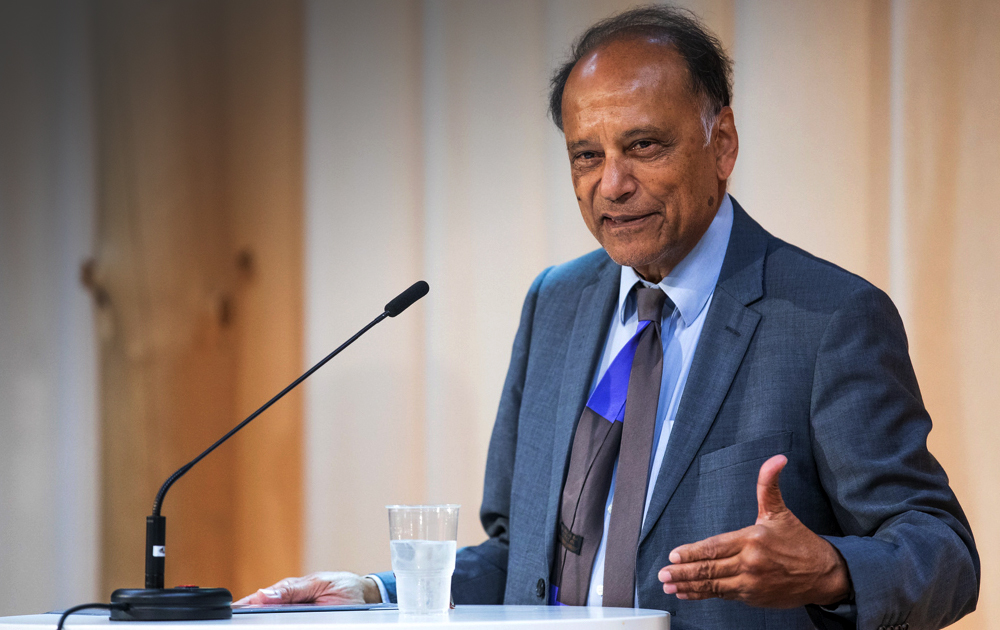 As responsible investors, we advocate for corporate and systemic reforms that will improve the health and well-being of communities, especially those communities bearing a disproportionate burden of disease. For decades, faith-based investors working through the Interfaith Center on Corporate Responsibility (ICCR) have engaged leading pharmaceutical and other healthcare companies on concerns related to access and affordability of medicines, vaccines, and other health technologies. We make the case to healthcare companies that, more than any other sector, their business model must prioritize people over profits as their practices have a direct impact on people’s well-being.
As responsible investors, we advocate for corporate and systemic reforms that will improve the health and well-being of communities, especially those communities bearing a disproportionate burden of disease. For decades, faith-based investors working through the Interfaith Center on Corporate Responsibility (ICCR) have engaged leading pharmaceutical and other healthcare companies on concerns related to access and affordability of medicines, vaccines, and other health technologies. We make the case to healthcare companies that, more than any other sector, their business model must prioritize people over profits as their practices have a direct impact on people’s well-being.
Medicines Only Work if you Can Afford Them
Access to affordable health care often remains frustratingly out of reach, particularly for people living in low- and middle-income countries. Here in the U.S., the cost of branded medicines outpaces other countries in many cases by a factor of two. As a result, one in four adults in the U.S. today will not fill a prescription, will cut pills in half, or skip doses because of cost. Without access to affordable medicines and healthcare, workers can’t work, which creates systemic economic risks for all stakeholders including healthcare companies and their investors.
The prohibitively high cost of medicines in the U.S. is often cited as one of the most critical and intractable issues by a majority of Americans and, for this reason, strategies to reduce the cost of medicines have been the subject of multiple Congressional hearings and proposed legislation. Yet drug pricing has proven a remarkably stubborn problem to solve through legislation. This is due largely to the powerful influence of the pharma sector and its trade associations on our legislative and regulatory structures through expansive and opaque lobbying and political donation campaigns.
Preventing Healthcare “Apartheid”
Notably, access to affordable healthcare can be extremely disparate with blatant discrimination often occurring along racial, gender and income lines. Nowhere was the gulf between the haves and have-nots laid barer than during the pandemic. As the world first began to grapple with the COVID-19 pandemic, many public health officials foresaw it would not be an equal opportunity virus; in fact, COVID-19 has been quite efficient in exacerbating the systemic inequities that have long plagued marginalized communities, often people of color, where structural racism, discrimination, and the negative impact of both corporate and social influencers of health have put them at an extreme disadvantage. Faith-based investors issued early warnings against the potential for a vaccine apartheid that would disenfranchise low income and communities of color across the globe. We believed the significant public investments in the creation of COVID vaccines and therapies compelled companies to prioritize equitable access and affordability.
The Problem with the Patent System
In their shareholder engagements, faith-based investors have used a variety of strategies to advocate for policies and practices that would increase access to medicines to both reduce harm and improve health outcomes, including shareholder proposals requesting lobbying in alignment with access strategies, proposals calling for the transfer of technology and Intellectual Property (IP) to generics manufacturers to broaden access outside of high-income markets, and proposals calling for an end to anti-competitive practices such as the misuse of patents. Because IP protections on branded drugs play such an important role in maintaining high prices and impeding wide scale access to medicine, they have been the subject of multiple engagements with pharmaceutical companies. When patent protection on a drug ends, generic manufacturers can enter the market with a lower-priced formulation that generally results in increased access. However, branded drug manufacturers often deploy a variety of strategies to delay generic competition and extend their exclusivity periods in order to maintain a higher price point. We see a big difference between the legitimate use of patents designed to protect the rights of the maker of an innovative medicine and the misuse of the patent system to delay the introduction of generic drugs to allow for price increases on existing drugs. In our engagements, we ask pharma companies to tell us how they are considering access when they seek secondary and tertiary patents on their drugs.
The Government’s Right to Bargain
One of the reasons Americans pay more for prescription drugs than anywhere in the world is because the U.S. is one of the only countries whose government is not empowered to negotiate drug pricing on behalf of Medicare and Medicaid recipients. Therefore, when the Inflation Reduction Act passed last year with the provision that Medicare will have the right to negotiate prices for 10 of the most expensive drugs for its beneficiaries, American seniors breathed a collective sigh of relief. Yet, the backlash from the pharma industry was remarkable in its swiftness, forcefulness, and in its apparent coordination. A series of pharma companies and their trade associations began filing lawsuits against the Department of Health and Human Services (HHS) and Centers for Medicare and Medicaid Services (CMS), alleging “extortion” and a violation of 1st and 5th Amendment rights. While the lawsuits highlight a variety of grievances – from “extortion” to “compulsory speech”, they share a common theme: that the government’s attempt to negotiate prices on behalf of millions of Medicare recipients is “unconstitutional.”
The faith-based investor response was equally swift, and an investor statement was organized decrying the lawsuits as running afoul of corporate mission and values statements. We believe working to make medicines more affordable, particularly for seniors, is an appropriate and laudable goal for the U.S. government and would hope that drug manufacturers would work with, not against them.
Healthcare will Always be a Human Right
As investors representing faith-based institutions, several of them with ties to the healthcare industry, we see the toll a lack of access to affordable, quality healthcare can take on our communities and how those impacts can ripple out to create broader systemic threats to our economy and society. We believe healthcare is a human right that should be accessible to all, and this view is supported by numerous international conventions including the Universal Declaration of Human Rights, the UN Sustainable Development Goals, and the UN Guiding Principles on Business and Human Rights (UNGPs). Yet, we would argue that the current business model of pharmaceutical and other healthcare companies far too often prioritizes profits over patient health in violation of people’s human rights. In our work going forward, we will be taking a human rights lens to all our engagements with healthcare companies. Several proposals have been filed for 2024 proxies calling on pharma companies to conduct human rights due diligence in accordance with the UNGPs. Given pending legislation in the EU that would mandate human rights due diligence, the way we see it companies implementing the proposal will be ahead of the curve. Drug manufacturers have a responsibility to operationalize a business model that promotes human rights worldwide. If, as all companies in this industry state, patients are indeed the most important part of their business, this should be an achievable task and we look forward to continuing to work with them to make it a reality.
Article by Lydia Kuykendal of Mercy Investment Services and Cathy Rowan of Trinity Health
Lydia Kuykendal has spent the last 15 years in health advocacy leading issue campaigns, managing coalitions, acting as a media spokesperson, cultivating strategic partnerships and lobbying elected officials. Her current position as Director of Shareholder Advocacy at Mercy Investment Services allows her to engage directly with publicly held companies on issues such as access to health care, human rights, gun safety, transparency in artificial intelligence, and anti-racism. In the past she has worked for Louisiana State University and The American Cancer Society’s Cancer Action Network. Before coming to Mercy Investments, she served as Engagement Director at Giffords, a national gun violence prevention organization. There she worked to develop and implement engagement strategies and campaigns to reduce gun violence at the national, state, and local levels. A native of North Carolina, she is a 2004 graduate of North Carolina State University with a B.S. in Biomedical Engineering and earned her Masters of Public Health from Tulane University in 2006.
Since 2003, Cathy Rowan has been the Director of Socially Responsible Investments for Trinity Health, a large Catholic health care system in the United States and a member of the Interfaith Center on Corporate Responsibility (ICCR). A former ICCR Board member, Cathy engages companies on Trinity Health’s behalf on health equity, food and nutrition, tobacco control, environmental health and gun violence issues. She also serves as a corporate responsibility consultant for the Maryknoll Sisters, a congregation of women religious who serve in 18 places around the world, representing them in shareholder engagements on global health, climate change, responsible lending, water and eliminating child sexual exploitation online. Her involvement in impact investing also includes growing Trinity Health’s community investment program, and leadership on the boards of Mercy Investment Services, Oikocredit USA, and the Leviticus 25:23 Alternative Fund.
From 1987-2002, Cathy was a Maryknoll Lay Missioner, living in Sao Paulo, Brazil for six of those years with her husband and two children, and working with a human rights team, women’s groups and a child nutrition program.



















